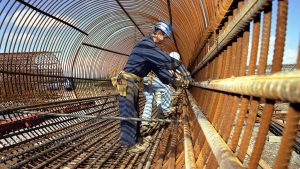In the case of the Association of Consulting Engineering Companies-Canada (ACEC), the need for improvement in the state of asset management in Canada rated as a key finding in the first-ever Canadian Infrastructure Report Card.
The study, recently released by the Federation of Canadian Municipalities (FCM) and three partner organizations, points to the cost of delaying infrastructure repairs, rehabilitation or renewal.
It emphasizes the importance of having an asset management system in place to establish practices that will increase the longevity of the assets and optimize investments in maintenance and rehabilitation.
“I think the report card confirms something that many of us had suspected, that there is a need to improve asset management practices in Canada,” said ACEC president John Gamble, who represented the association on the report card advisory board.
“Asset management is critical to developing sound, long-term infrastructure planning. It provides a basis upon which one can leverage life-cycle savings over the long term. And it is an opportunity to demonstrate value to taxpayers, who are ultimately paying for these assets.”
The need to support additional asset management capacity at the municipal level was cited for all four infrastructure categories that were assessed in the report card: roads, drinking water, wastewater and stormwater systems.
The report card surveyed more than 120 municipalities.
When assessing the state of municipal infrastructure management, the report card found that many municipalities lack the internal capacity to accurately assess the state of their infrastructure.
“This is not to say that the municipal sector lacks the wherewithal to undertake rigorous internal reviews of their assets; rather, that finite financial resources, staff and time preclude a more thorough, real-time evaluation of the state and performance of their physical infrastructure,” he said.
For example, the report said, about 30 per cent of respondents had limited data on their water treatment plants, reservoirs or pumping stations.
A large percentage of municipalities reported having no data on the condition of their buried infrastructure: 41.3 per cent for distribution pipes and 48.2 per cent for transmission pipes.
“While it is clear that municipalities monitor the quality of their drinking water through rigorous testing, evaluating the physical condition of their treatment plants and buried distribution networks remains a significant, on-the-ground challenge for many municipalities to undertake on their own,” Gamble said.
With respect to roads, the report said many respondents do not have regular condition assessment programs: 41.2 per cent reported that they do not have an inspection program for their highways.
The percentage dropped to between 20–25 per cent for arterial, collector and local roads.
Gamble, whose association made the case in its pre-budget submission for adoption of practices to quantify the condition and remaining service life of existing infrastructure, noted that there are owners of infrastructure, who do in fact have sound asset management practices in place.
“We need to facilitate a means of sharing those best practices,” he said.
Gamble said one of the challenges facing all levels of government in developing infrastructure programs is creating an incentive for public owners to adopt asset management practices without penalizing owners who have sound and sophisticated practices in place.
He said the ACEC considers the infrastructure report card an extremely important and valuable tool.
The entire stakeholder community owes a vote of thanks to the founding partners, he said. The FCM partnered with the Canadian Construction Association, the Canadian Public Works Association and the Canadian Society for Civil Engineering to deliver the report card.
“We’re looking forward to working with them in the future,” he said.










Recent Comments
comments for this post are closed